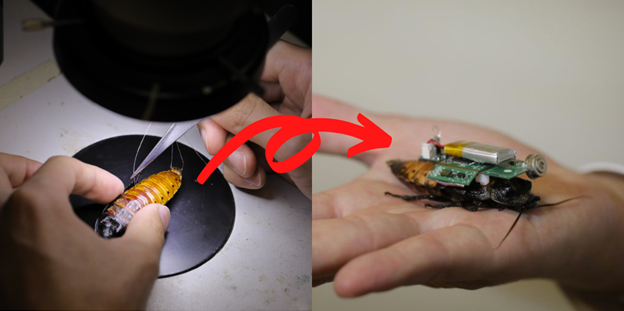A fascinating but strange study has been published by an international team of researchers on Monday. This study includes a system that we can install on a cockroach that will allow us to control the movement of cockroaches from a distance. The Madagascar hissing cockroach, a black-and-brown invertebrate that will be used in the experiment to create insect cyborgs that could one day be used to monitor the environment or help with urban search and rescue missions after a natural disaster, and the system is powered by solar energy.
Madagascar hissing cockroach feels threatened, it squeaks out a hiss by quickly passing air through holes in its back. The result is something resembling the rattle of a snake’s tail. The system is simply a cockroach backpack wired into the creature’s nervous system. Pressing a button sends a shock to the backpack that tricks the roach into moving in the desired direction.
The publication state’s that;
“Cyborgs, which are integrations of machines and organisms, can be used not only to substitute an organism’s defective body parts but also to realize functions that exceed the organism’s normal capabilities. Advancements in electronics have resulted in the increasing integration of organisms and machines.”
The idea of attaching an electric backpack to cockroaches is not a new one. It came into existence back in 2012, researchers at North Carolina State University were experimenting with Madagascar hissing cockroaches and wireless backpacks, showing the critters could be remotely controlled to walk along a track. It was done by attaching electric wires to two “cerci” (sensory nerves) of the cockroaches attached to the abdomen of the cockroach.
Kenjiro Fukuda, an expert in flexible electronics at Japan’s Riken, said regarding the current advancements in the cyborg system.
“The current system only has a wireless locomotion control system, so it’s not enough to prepare an application such as urban rescue. By integrating other required devices such as sensors and cameras, we can use our cyborg insects for such purposes”
The published study indicated that the system can be used at a much lower power supply and can still provide adequate results in terms of indicating anything. This way the scientist would be able to monitor the environment without having to think about the battery dying out early.
“The miniaturization and fabrication of low-power consumption semiconducting chips through micro/nanofabrication have resulted in small-organism cyborgs. In particular, cyborg insects with small integrated circuits to control their behavior have been proposed for applications such as urban search and rescue, environmental monitoring, and inspection of dangerous areas.”
This research is still in the experimental stages and far from being used anywhere in the world. But it has the potential to foresee many environmental threats and catastrophes like earthquakes or tsunamis. Its true usage can not be yet predicted, as some critics suggest that it will be used as a spying weapon by countries and it should never be implemented.
Read More:
This Pakistani scientist just achieved a cancer research breakthrough
Pakistani professor among top 1 percent of the world’s computer science researchers











